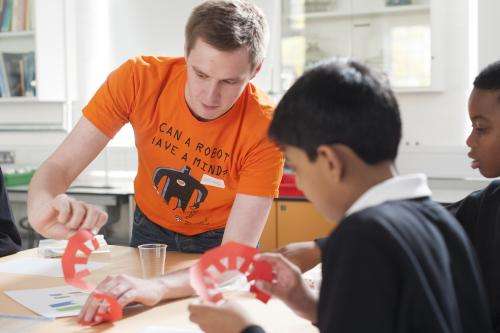Preparing local schools for teaching evolution in the classroom

When did life first appear on Earth? What does evolution say about the existence of humans? The topic of evolution has been added to the Year Six primary school curriculum and will be mandatory in all schools across the UK from next year. But are schools adequately prepared for this controversial addition to the timetable?
The University of Reading's Institute of Education is running pioneering events for schoolchildren and teachers to progress current thinking on how children's learning about evolution, and their questions, can be effectively managed in the classroom.
On 12th November, over 300 ten-year old children from 11 different schools visited the Institute of Education for a jam-packed day of activities, experiments and talks exploring the big questions that bridge science and religion.
Children had the opportunity to put their questions to experts in biology, geology, theology, philosophy and more - and to hear from scientists and academics with religious and non-religious worldviews. Workshops included creating a "washing line of time"; discussing whether this is at odds with 'religious time' and the biblical explanation of how Earth developed, making rockets to explore the Big Bang theory and analysing fossils to ask whether, and how, science is compatible with creation and religious faith.
There was also a guest appearance by famous physicist Isaac Newton, together with a panel of eminent scholars who tackled questions such as whether a scientist can have religious faith.
The event formed part of the Learning about Science and Religion (LASAR) project which looks at how questions which bridge science and religion are handled in schools. Dr Berry Billingsley, Associate Professor of Science Education at the University of Reading's Institute of Education, is leading the project.
Dr Billingsley said: "It is fantastic that evolution is to be taught in primary education but many schools are anxious about the best way to teach these ideas. Primary school teachers know their children well and like to give children time to ask questions. Right now they are looking for help with getting to grips with the science and also how best to teach it."
Dr Billingsley: "Our research in secondary schools shows that not being prepared for questions about creation when teaching evolution means it becomes a 'squeezed out topic'. Children learn to avoid asking questions which they believe to be contentious and this can reinforce for them the myth that science and religion must be seen as opposite ideas. We hope that children and teachers who come to this event will take away an enthusiasm for finding out more about evolution together with the idea that science and religion are mostly concerned with different types of questions: Science seeks to discover the mechanisms of how living things have developed whilst religion is concerned with why we exist at all. These kinds of ideas can help children appreciate that they don't need to choose between evolution and a religious faith and help them to see why numerous eminent scientists say they are comfortable with both."
The event was very successful and proved popular with both teachers and pupils alike.
Jo Davis, teacher at The Willows Primary School in Newbury said: "We are a multi-faith school so we have children from a range of different backgrounds, including Muslims, Sikhs, Catholics and atheists. When I'm teaching them Science, I am always conscious that I don't want to impinge on their religious beliefs because we do also teach them about the different creation stories, but it can be difficult at times.
"Coming to the event run by the University of Reading has been brilliant. The children have really enjoyed themselves and it has given them a good overview of the theories of Science and religion and how these ideas can come together, which will stand them in good stead at they move up into secondary education. From my point of view, I have got some good ideas that I can take back to the classroom about how to teach my pupils about evolution from both a religious and a scientific perspective. As the new curriculum comes into place next year these types of events will be very valuable for both children and teachers."
More information: www.lasarproject.com/
Provided by University of Reading
















